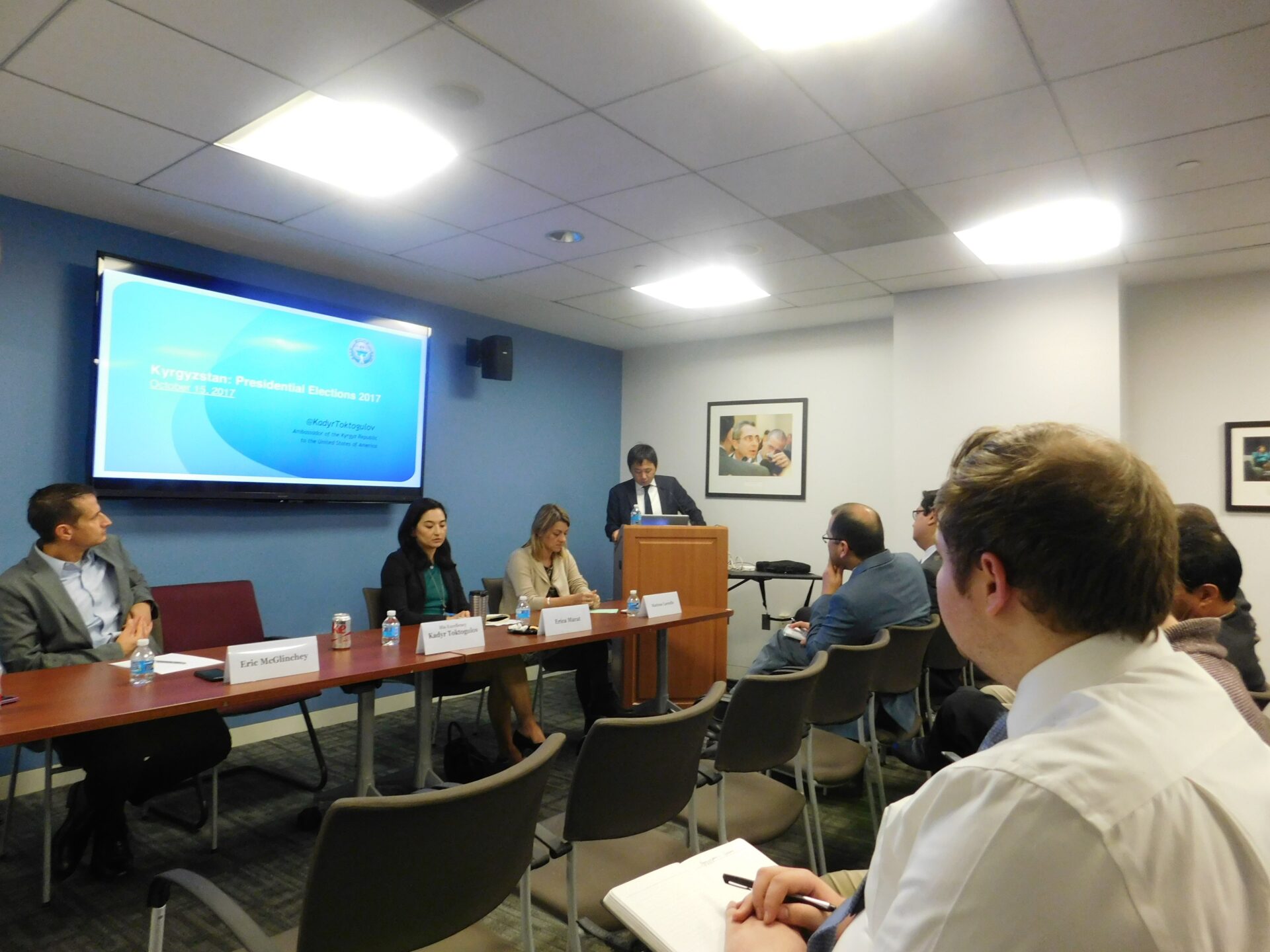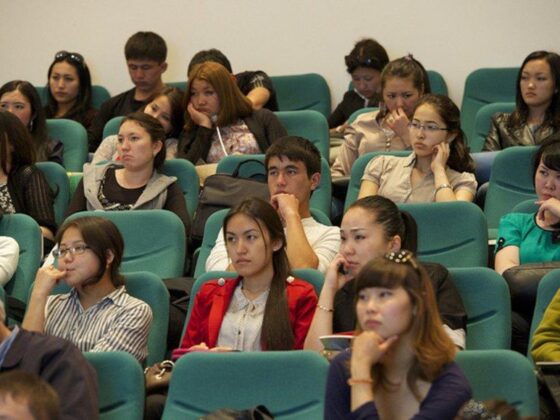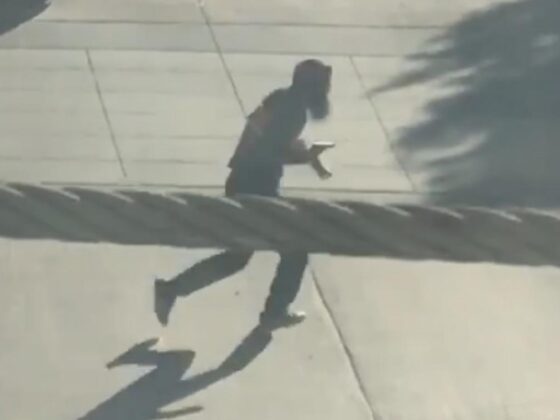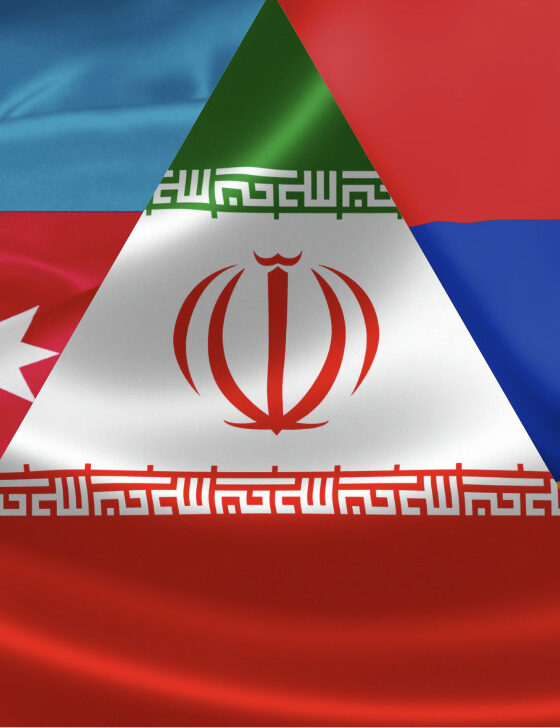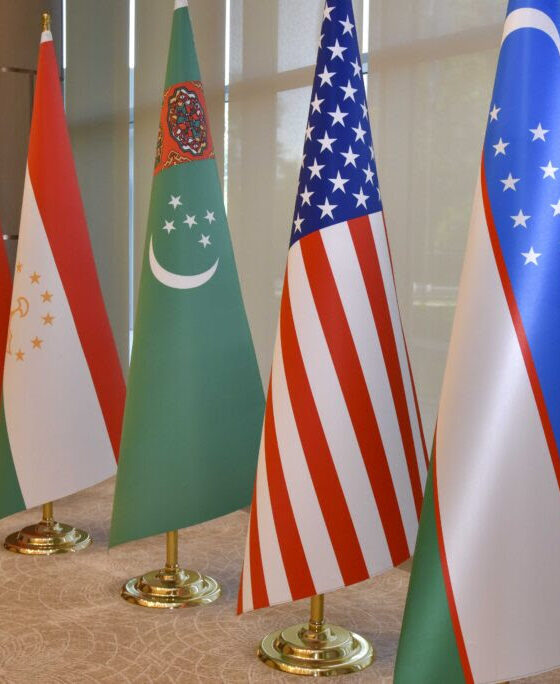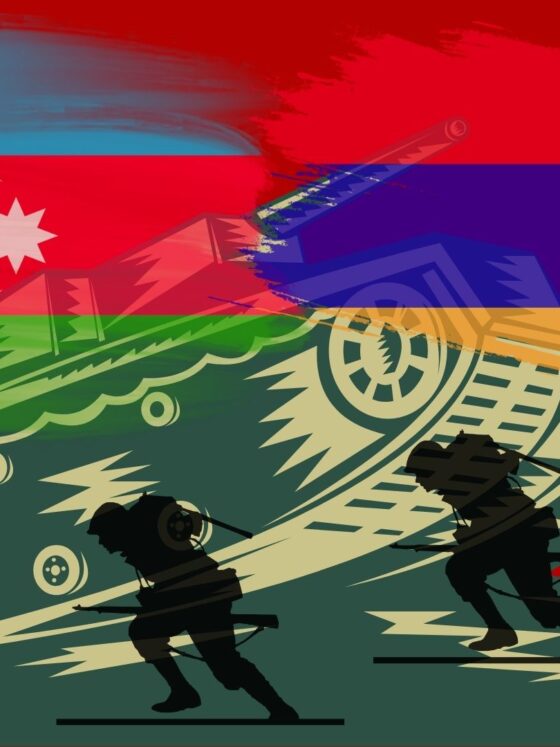By CAP
Transcript
First of all, I would like to thank Marlene Laruelle and George Washington University Central-Asia Program for hosting this event. It’s an important discussion on the future of Kyrgyzstan after the presidential elections. And it’s great to join Erica Marat, Eric McGlinchey and Paul Stronski on this panel.
Today’s gathering is a great opportunity to discuss Kyrgyzstan’s journey as it has been undertaking important political and democratic milestones. It’s certainly not a secret that my country has always stood out in the region for its politics, for big events that will put Kyrgyzstan on the front pages of the world newspapers.
Events of 2005 and 2010, revolutions that ousted corrupt presidents and their governments and sent them, and their family members fleeing to Russia and Belarus were a testament to Kyrgyz people’s determination not to put up with presidents that didn’t care about the country’s development and were only interested in enriching themselves and their own associates.
Today I’d like to talk a little bit about the country’s journey since 2010. It’s very clear to me that last weekend’s presidential elections served as some sort of a conclusion of the transformation the country has been going through.
Any event on Kyrgyzstan, which is not one of the most popular country names here in this town, draws people like you who have been there and know quite a lot about the processes in my country. It’s always flattering to hear about Kyrgyzstan’s nature, but Kyrgyzstan is more than just about beautiful mountains. It’s not just a country of six million that is next to China and whose one of the main strategic allies is Russia. It’s a country that has already held a number of parliamentary and presidential elections, which were recognized by western observers.
Last weekend’s presidential vote, which was one of the most competitive and open elections in Kyrgyzstan’s recent history is something that I’m proud of. The elections were recognized and accepted by voters, international observers and most importantly by the runner up, Omurbek Babanov which sets a new tradition in Kyrgyzstan’s politics.
When outgoing President Almazbek Atambayev came to power in 2011 with 63% of the votes, and that’s a figure, which you never see for an elected president in Central Asia, he was committed to ensure that the electoral process improve dramatically, so that voters and parties, and candidates, never doubt the outcome.
Previous fraudulent elections were one of the reasons for popular uprisings of 2005 and 2010. President Atambayev soon after coming into office began working with key political parties in parliament, the government and international partners in introducing new technology to the electoral process.
The introduction of biometric verification of voters was the single most important factor in preventing fraud at the poll and ballot boxes. I remember in the elections prior to 2010, it didn’t really matter if you had enough voters to secure victory, you only needed enough ballots that you could stuff the ballot boxes in one’s favor. The parliamentary elections of 2015 were the first time the new technology was used, and was seen as the main reason for lack of any post-election protests. As a result, we saw real vote tally, decreased voter turnout but the one that was reflecting real numbers.
Last Sunday the biometric verification of voters was used for the third time in a national election. This time we elected, the new President was the lowest number of votes in his favor, – 54%. This certainly reflects a fierce competition between two former Prime Ministers who turned out to be two leading candidates for President.
The campaign wasn’t always smooth. Pretty much all of the candidates complained of foul play. Some news reports described that the elections were dirty. My take on it is that it reflected the fact that this was the kind of election whose outcome couldn’t be predicted from the beginning.
For Kyrgyzstan it was a new experience. Usually, we would know who was more likely to win or almost guaranteed to win, but not this time. All election drama was concluded just a couple of hours after the polls closed as smart ballot boxes fed their data to the central election commission server.
For the first time, we used the smart ballot box here at the embassy, last Sunday. I was certainly impressed with a paper slip that the ballot box produced after we closed the voting. The paper gave all the numbers of votes every candidate received, including “against all” line. There is actually a joke that “against all” is the first and last name of the candidate that never gives up and shows up on every ballot in every election.
I knew that international recognition acceptance of the results was important for the country. The European Election Observation mission, which included representatives of the OSCE, European Parliament, OSCE Parliamentary Assembly, and the Council of Europe, in its opening statement said that the “Presidential election in the Kyrgyz Republic contributed to the strengthening of democratic institutions by providing for an orderly transfer of power from one elected President to another”. “The election was competitive, as voters had a wide choice and candidates could, in general, campaign freely, although cases of misuse of public resources, pressure on voters and vote-buying remain a concern”.
I personally was satisfied with this assessment. The government will take note of the observation mission’s findings and continue its work to improve the electoral process as in just three years we will have another big test. The next parliamentary elections will be held in 2020, which I have no doubt will be no less competitive and important than the previous national elections.
This panel has posed a few questions on my country’s future. I’m confident that Kyrgyzstan will continue to be the leader in democratic reforms in the region, and will pave the way for the region’s democratic transformation.
The country’s immediate neighbors and traditional allies will be high on the list of priorities for the new President. The President-elect, Jeenbekov, will be inheriting strong relations with all our main partners, including Russia and China. Certainly, addressing some of the issues that came up in our relations with Kazakhstan just a couple of weeks before the vote tops his list. Yesterday Prime Minister Sapar Isakov was in Astana for talks with his counterpart. Both governments said that the meeting between the prime ministers led to the resolution of some of the major outstanding issues in our trade and cross-border cooperation.
There is still border negotiation to be completed with Uzbekistan, a neighboring country. This year was one of the most important years in our bilateral relations with Uzbekistan. The biggest achievement was the border delimitation agreement which covered 85% of our common border. Now we are working with our Uzbek friends to complete negotiation over the remaining parts of the border.
We are still working with our Tajik friends to conclude border negotiations with them. We are confident that the agreement will be reached, and it will be mutually beneficial.
Russia will continue to be one of our most important strategic allies. We share a lot with Russia, and there is important cooperation taking place in every sector of our economy. We have an important security cooperation and I expect it to remain this way.
China is one of our immediate neighbors. We have benefited greatly from China’s support for important infrastructure projects in Kyrgyzstan including in energy and transportation. It is a relationship that will retain its significance going forward.
As for our relations with the United States, both President-elect and the Prime Minister realize the importance of having strong and mutually beneficial relationship with the United States. We have traditionally had strong cooperation in such areas as, for example, education. There are great exchange programs, and Peace Corps is an important program in our partnership. American University of Central Asia, and I’m a proud alumnus of this university, is standing tall and will be celebrating its 25th anniversary next year. Radio Free Europe/Radio Liberty has its largest regional bureau for Central Asia based in Kyrgyzstan.
But with the transition here in the US earlier this year, and with transition in Kyrgyzstan, both governments will have to work to find areas of mutual interest that will contribute to the strengthening of our bilateral relations. It is no secret that since the departure of the US military transit center from Kyrgyzstan in 2014, we still haven’t been able to fill that great vacuum in our relations with substantial content. If you look at the history of our relationship, US military base had been in Kyrgyzstan for almost 13 years. That’s almost half of our history with the US, bilateral relations with the US. It’s a big challenge. We are working with our American friends to really find new substantial content that could fill that vacuum that was what we had in our relations.
In conclusion of my remarks, I’d like to note that President-elect Jeenbekov as opposed to the other leading candidate, didn’t campaign on the return to the presidential system. He will be President in a new political environment in which Prime Minister and Parliament will enjoy greater powers than under President Atambayev. So, I expect that the country will be moving towards strengthening the parliamentary system which should ensure political pluralism and the upholding of the rule of law and human rights.
Yes, the elections were not ideal and there were some concerns which will be taken into account as the next major elections are coming up in just three years – that’s parliamentary elections.
But if you look at the bigger picture, peaceful transition of power as the result of elections that have been recognized by international observers and accepted by voters is a big, big step forward for Kyrgyzstan and the region. And these were probably the first Presidential elections of this kind. Competitive, unpredictable. First elections, first presidential elections, when an outgoing president will have served his full term and will hand over his office to popularly elected President. So, in Kyrgyzstan we will have two individuals with a status of ex-president that will stay and live in the country and probably share the same compound that we call “state residence”.
I’d like to reassure you that Kyrgyzstan will continue on its course of democratic development, strengthening its sovereignty and independence. The new President and government will work hard in upholding the rule of law and protection of human rights and improving the lives of Kyrgyz citizens. And I look forward to our discussions after all the remarks by our speakers. Thank you very much.

